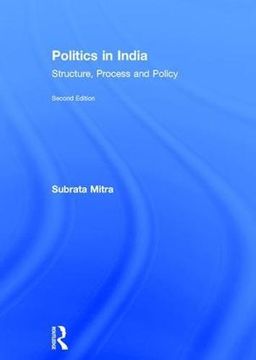Share
Politics in India: Structure, Process and Policy (in English)
Subrata Mitra
(Author)
·
Routledge
· Hardcover
Politics in India: Structure, Process and Policy (in English) - Mitra, Subrata
$ 196.70
$ 327.84
You save: $ 131.14
Choose the list to add your product or create one New List
✓ Product added successfully to the Wishlist.
Go to My Wishlists
Origin: United Kingdom
(Import costs included in the price)
It will be shipped from our warehouse between
Monday, June 17 and
Thursday, June 27.
You will receive it anywhere in United States between 1 and 3 business days after shipment.
Synopsis "Politics in India: Structure, Process and Policy (in English)"
The second edition of this textbook brings together general political theory and the comparative method to interpret socio-political phenomena and issues that have occupied the Indian state and society since 1947. It considers the progress that India has made in some of the most challenging aspects of post-colonial politics such as governance, democracy, economic growth, welfare, and citizenship. Looking at the changed global role of India, its standing in the G-20 and BRICS, as well as the implications of the 2014 Indian general elections for state and society, this updated edition also includes sections on the changing socio-political status of women in India, corruption and terrorism. The author raises several key questions relevant to Indian politics, including: - Why has India succeeded in making a relatively peaceful transition from colonial rule to a resilient, multi-party democracy in contrast to its South Asian neighbours? - How has the interaction of modern politics and traditional society contributed to the resilience of post-colonial democracy? - How did India's economy moribund--for several decades following Independence--make a breakthrough into rapid growth and can India sustain it? - And finally, why have collective identity and nationhood emerged as the core issues for India in the twenty-first century and with what implications for Indian democracy? The textbook goes beyond India by asking about the implications of the Indian case for the general and comparative theory of the post-colonial state. The factors which might have caused failures in democracy and governance are analysed and incorporated as variables into a model of democratic governance. In addition to pedagogical features such as text boxes, a set of further readings is provided to guide readers who wish to go beyond the remit of this text. The book will be essential reading for undergraduate students and researchers in South Asian and Asian studies, political science, development studies, sociology, comparative politics and political theory.
- 0% (0)
- 0% (0)
- 0% (0)
- 0% (0)
- 0% (0)
All books in our catalog are Original.
The book is written in English.
The binding of this edition is Hardcover.
✓ Producto agregado correctamente al carro, Ir a Pagar.

